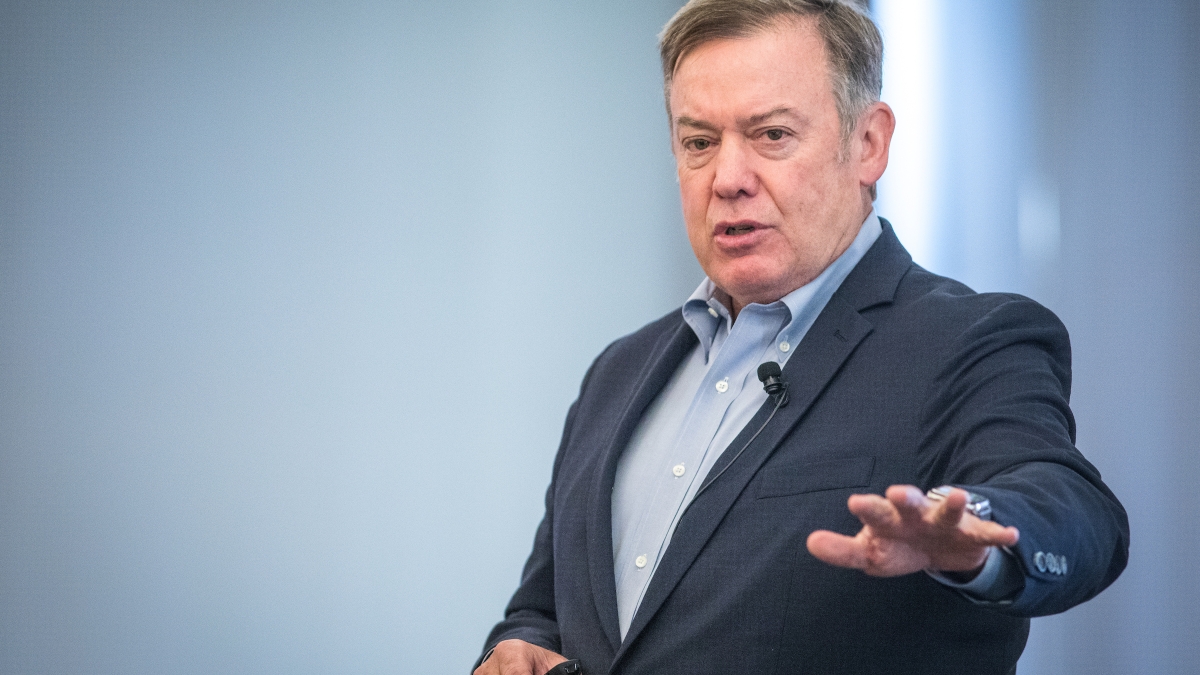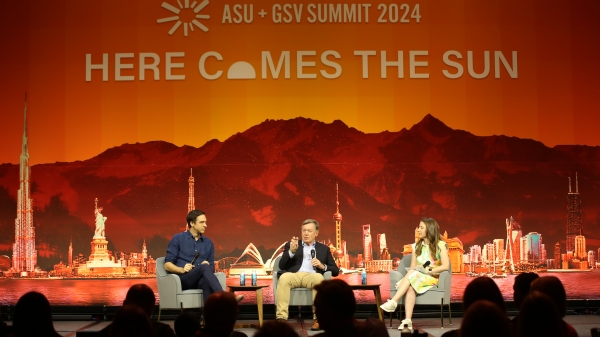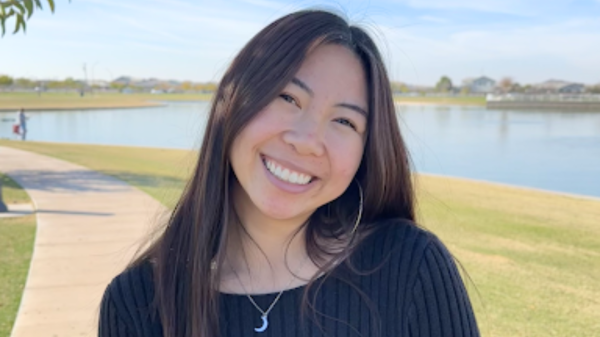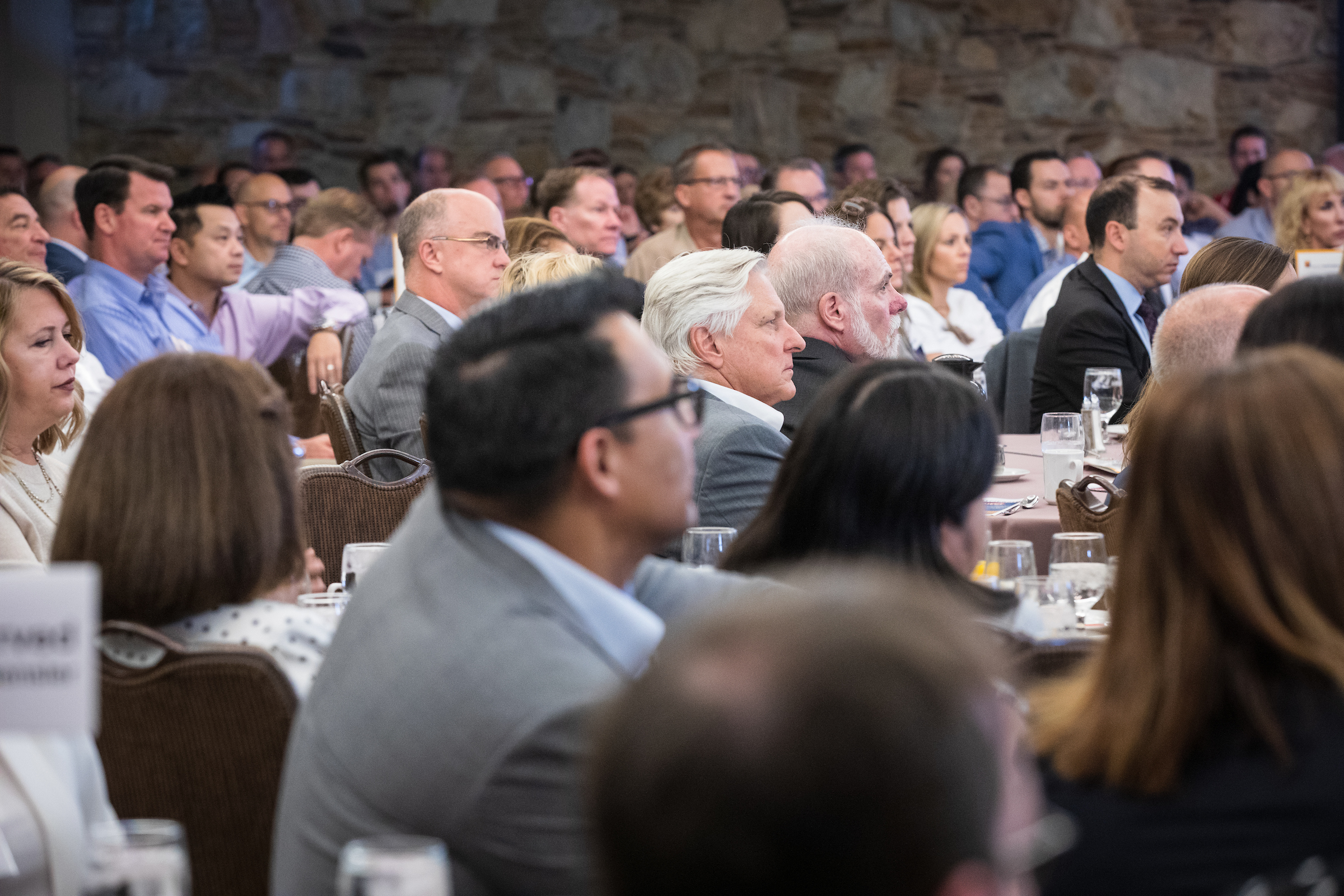Universities have a responsibility to strengthen Arizona's economy, Crow says
ASU president told Valley Partnership group that the goal is a generative economy

Arizona has recovered from the recession of a decade ago, but it’s a responsibility of the three public universities to further strengthen the state’s fragile economy, according to Michael Crow, president of Arizona State University.
Crow addressed the Valley Partnership advocacy group’s breakfast meeting on Friday, describing how the entrepreneurial model of ASU could only happen in Arizona, and how that innovation will help fill the gaping need for more college graduates in the state.
“Because we’re in Arizona, we found open-mindedness and we found ways to move the university forward other than as a government bureaucracy university,” he said.
“We made a fundamental shift in thinking that we couldn’t do in other states.”
Crow told the crowd that while some regions have anti-fragile economies, such as Seattle, which creates new industries, and some have resilient economies, such as Pittsburgh, which adapts well to change, Arizona’s economy is fragile.
“Fragility is a function of adaptation to change. We went through a recession and made a slow comeback and we do not yet have a highly adaptive, self-created, regional economy,” he said.
A major threat to Arizona is lack of educational achievement, with not enough young people graduating from high school and going onto earn university degrees, he said, noting that one of the fastest growing demographic groups in the state is Hispanics, who have a 9% college attainment rate.
“The new economy is one in which we must get everyone through high school,” he said. “And some might not be ready for college at 17 but might be perfectly ready at 22. In the past, that would be, ‘Too bad, your window has passed.’
“We're taking on this notion of looking at every person as a universal learner.”
Crow said that ASU has created charter schools in which all of the students graduate, as well as developed new ways to address college learners who need support.
“If you’re struggling with math, we have a new way to learn. Didn’t finish college? We have a way for you to finish. Want to take a few courses and get a micro bachelor's or micro master's? No problem.”
And the university made these changes, including doubling the number of engineering graduates, as it transitioned away from dependence on state funding, he said, noting that about 91% of ASU’s revenue comes from other sources.
“We have unbelievable potential,” Crow said of Arizona. But the state needs higher educational achievement.
“Now we have to figure out how we’ll build an economy that is more than just attractive to those on the outside — one that is creatively generative from the inside.”
Arizona Regent Fred DuVal (center) joins more than 320 people in listening to President Michael Crow's keynote address that focused on how ASU and other universities have handled our state's transforming economy, and how schools plan to take secondary and postsecondary education to a higher level to meet the future. Photo by Charlie Leight/ASU Now
Several development and workforce experts continued the discussion after Crow’s speech. John Arnold, executive director of the Arizona Board of Regents, said that one way the universities boosted revenue after state funding declined during the recession was to attract large numbers of out-of-state students.
“We’re charging them market price for a degree and it turns out our degrees have a great deal of value,” he said.
“But there’s a risk in that entrepreneurial model. There is a coming reduction in the number of young people, which will hit not only university enrollments but employment markets.”
Al McGuire, a longtime Arizona economist, said that universities contribute economic value by producing an educated workforce.
“Workforce is knowledge, skills and culture and that’s the most important things that the universities do,” he said.
Another way that ASU has produced revenue is through real estate partnerships.
“Every project we do, whether it’s the research park, Novus, the downtown biomedical campus or SkySong, is rooted deeply in the university’s mission. It’s not rooted in a market-driven return on investment,” said John Creer, the assistant vice president for real estate at ASU.
“It’s taken us 30 years to develop our research park in south Tempe and we call that successful,” he said. “It’s something we can do patiently and deliberately.”
Rick Shangraw, CEO of ASU Enterprise Partners, said that ASU has greatly increased its revenue from donations, raising more than $400 million last year.
“We’re not only asking people to provide resources to ASU because they’re affiliated, we also have a lot of causes that prompt people to be active in what we’re doing with the university,” he said.
Arnold noted that there’s been a lot of discussion lately about whether higher education has value.
“I do not understand where that comes from,” he said. “The data has never been clearer on the value of a four-year degree both in terms of economic benefit and personal benefit.
“It’s about a more abundant life, and higher education delivers that to you.”
Top photo: President Michael Crow delivers "A Higher Level of Higher Education: How Arizona Universities Are Facing The Future," at Valley Partnership's meeting at the Phoenix Country Club on Aug. 23, 2019. Photo by Charlie Leight/ASU Now
More Arts, humanities and education

Chemistry classes are key to art student's success
Amanda Barnette has a passion for art preservation. That means that, for the past four years, the Arizona State University student’s schedule was filled with classes that fit her artistic bent:…

ASU+GSV Summit tackles big questions about AI, technology, education
Editor's note: We'll be updating this story daily throughout the summit. The annual ASU+GSV Summit kicked off in San Diego on Sunday, drawing thousands of leaders for a four-day event that focuses…

Sanford School Dean’s Medalist passionate about serving families, community
Editor’s note: This story is part of a series of profiles of notable spring 2024 graduates. Helping families and children succeed in society takes knowledgeable and understanding professionals. Few…
